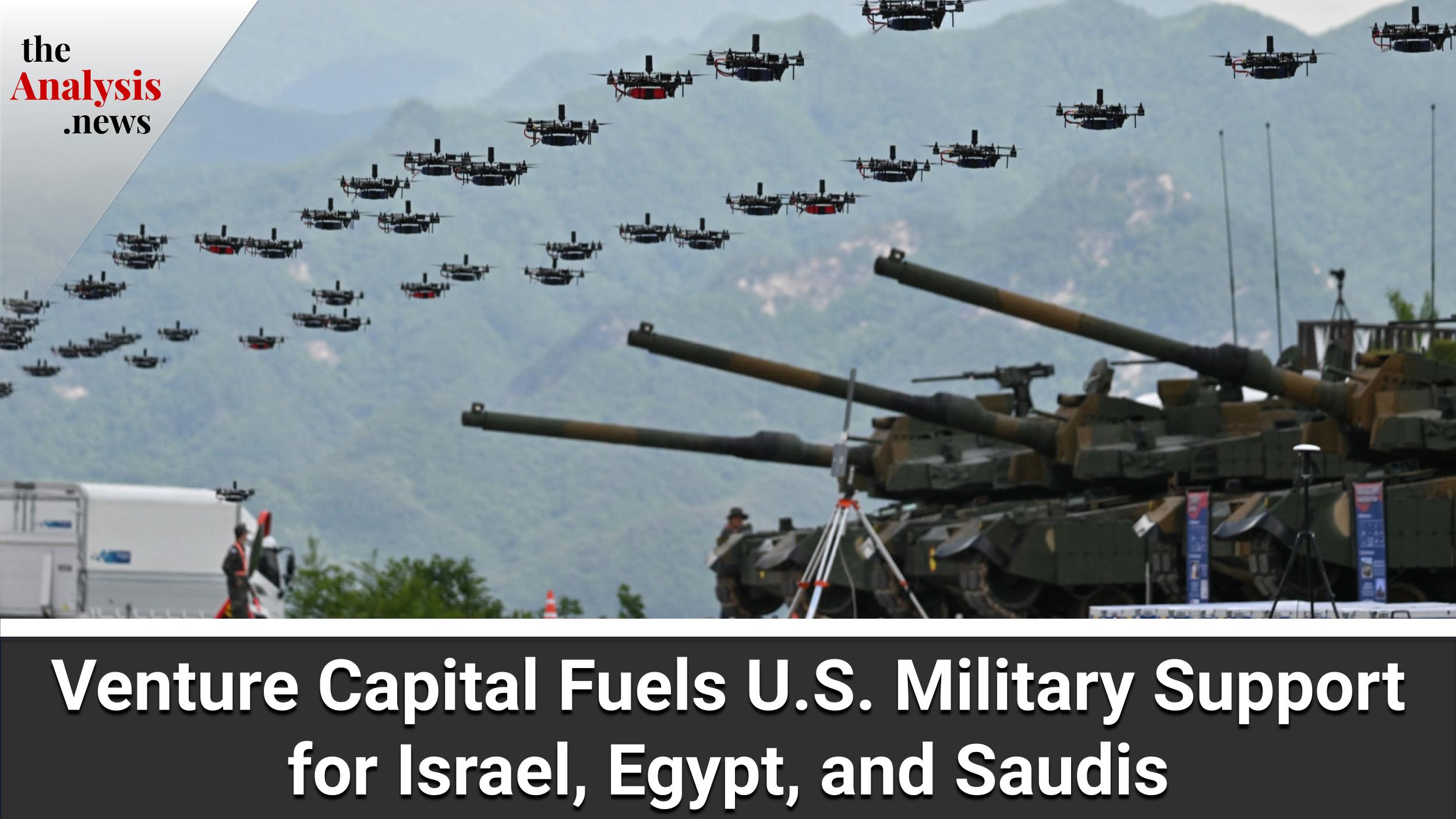Dr. Shana Marshall is the Associate Director of the Institute for Middle East Studies at George Washington University in D.C. She highlights a crucial element of financing the military and defense technology sector by venture capitalist and private equity firms with dubious financial and political interests. She explains how the business models of these firms shape the sort of weaponry produced in the U.S., such as an increase in drones and AI-powered systems and the “attritable” form of warfare that is waged as a result. Furthermore, she argues that U.S. policy in the Middle East and American support for authoritarian regimes has had dire consequences for the people in the region.
Talia Baroncelli
Hi, I’m Talia Baroncelli, and you’re watching theAnalysis.news. I’ll shortly be joined by Shana Marshall to speak about how financial actors fund the development of military and defense technology.
If you enjoy this show and would like to support the work we do, you can go to our website, theAnalysis.news, and hit the donate button at the top right corner of the screen. You can also like and subscribe to our show wherever you listen or watch it, whether on YouTube or other podcast streaming services. Feel free to contact us with any suggestions on topics we should cover. See you in a bit with Shana Marshall.
Joining me now is Shana Marshall. She’s the Associate Director of the Institute for Middle East Studies at the George Washington University in D.C. Thanks so much for joining me today, Dr. Shana Marshall.
Shana Marshall
Thanks for having me.
Talia Baroncelli
I’m really excited to have you today because, with you, we can speak about the big picture issues when it comes to political economy and the different actors that are involved in the military-industrial complex and the defense tech industry. My first question to you would be, who are the different financial actors, the prominent actors right now in the military, industrial, and defense tech industry? Primarily in the U.S., of course.
Shana Marshall
Of course, you have what we would call the “primes,” or the OEMs, the original equipment manufacturers. Those are the Lockheeds, Boeings, Raytheons, and Thales, the behemoth firms. That’s not so much what I’m looking at. I am looking at these VC or venture capital-backed defense tech firms that have exploded since around 2015.
Half of the story is the supply side, and then the other half is the demand side. The supply side is this enormous accumulation and concentration of surplus capital at the very top of the economy in the U.S. That consolidates in the form of venture capital and also in areas like private equity, which is also taking an increasing role in the military-industrial complex, which we can talk about if you’re interested.
There are thousands of venture capital funds. There are a few dozen that are hyper-focused on the defense tech industry. Some of the largest ones are very interested and very active in backing defense technology startups. Not just backing them and helping to get them up and running but also going over to civilian tech startups and getting them to transform their operations, research, and products into ones with military applications. So it’s coming from all sides.
The major VC funds that are super-invested in defense tech are Founders Fund, Andreessen Horowitz, Lux Capital, Shield Capital, and Nvidia. There’s a huge range of much smaller firms that have much smaller capitalizations and much less money to work with. But those are some of the big-ticket ones, and they fund a lot of the companies that you’ve probably heard about in the news: Anduril, Palantir, Shield AI, Skydio, and Helsing. A lot of these defense tech firms that you’ve probably read about because they’re involved in questionable activities, a lot of surveillance tech, a lot of autonomous weapons tech, and very active, obviously, in Israel right now because, of course, the Israeli occupation infrastructure is extremely automated. A lot of Palestinians never even see an Israeli. They may hear their voice over a loudspeaker, or they may see something on a camera, but it’s very electronic and it’s very automated. They’ve been in the news a lot.
The supply side, that venture capital side, is because you have these extremely wealthy tech entrepreneurs who were invested in PayPal, Spotify, and all of these other tech firms. They accumulated enormous surplus capital stores and wanted somewhere to put it. Now, you have these huge venture capital funds. It makes a lot of sense for them to put it in the military-industrial sector because that’s the one sector that the U.S. government still subsidizes. There’s been a hallowing out of all other forms of public investment, but because you have such an enormous annual Pentagon budget, $800 billion, probably more, if you count some of the off-budget spending items. That’s a huge magnet for investment capital because they know that there’s always going to be a market for that. There’s always going to be a lot of demand. For them, it’s a very natural extension right from the technology firms that they were involved in, accumulating this enormous amount of capital and then using it to finance new defense tech startups in the U.S., Europe, the Middle East, Asia, and all over the world.
Talia Baroncelli
Over the past two decades, there’s been a real convergence of resources in the military and defense tech industry. I remember reading a Financial Times article from 2021 saying that 54% of the Pentagon budget goes to spending on defense contracts. I’m wondering how these newer financial actors, like venture capital and private equity, are changing the playing field. Are they disrupting that monopoly that a lot of the Big Five companies have traditionally had? Raytheon, Lockheed Martin, and those companies.
Shana Marshall
It’s funny that you use the term disrupt because they’re from the tech industry; that’s also the terminology that they use when they’re talking about how they’re going to revolutionize the U.S. military-industrial complex.
Most of the money does go to contractors to pay for heavy equipment because that equipment is so expensive. Part of the VC-backed defense tech sector, part of their selling point, is that what they’re going to provide is very distinct from what those OEM, the original equipment manufacturers, the Boeings, the Lockheeds, it’s going to be very different from what those firms provide.
The focus is very much on smaller, very high-tech, modular, mass-production, and commoditized hardware. Things like drone swarms. This is very much front and center for these firms in terms of what they’re going to provide. A lot of it is software. A lot of it is AI-driven targeting systems.
There was a really great article in +972 Magazine that came out in the past few days about how the Israeli army was using AI to generate literally thousands of targets in the contemporary war on Gaza and also how they had been used in previous conflicts. If you think about the amount of time that it takes an intelligence analyst to identify a target based on all of this incoming data, an AI can generate literally hundreds, thousands of targets in the same amount of time.
What they’re pushing, what they’re promoting is revolutionizing the way the U.S. military conducts war. It’s very clear to me that what they’re selling is a way of changing the way the U.S. military engages in warfare so that it matches up with their business model, so that it matches the technologies that they are developing.
The number of white papers, policy papers, and public lectures that VC founders and defense tech executives are giving throughout the United States right now is pretty incredible. If you read a lot of the stuff that they’re writing, they are talking about how the Pentagon needs to be completely transformed in the way that it conducts procurement, and the U.S. military needs to be transformed in the way that it conducts warfare. They point to the big primes, and they say these are archaic dinosaurs that develop extremely expensive bespoke weapon systems that sometimes don’t work very well, it costs a lot of money, and sometimes it’s not useful in theater. But what we’re developing is the equipment that’s going to be used in the war against China, the equipment that we need to be giving to the Ukrainians right now, and the equipment that Israel can use in its war on Gaza.
For them, certainly, it’s about making money. But that has to be couched discursively, at least in some language, about changing the way the U.S. military engages in war, reforming the Pentagon, and cutting through bureaucracy. It’s very much the sense that America is a declining empire. That these guys, because they’re all guys, are going to rescue us from that decline. They’re going to restore the empire through developing these new technologies that are going to allow us to confront China, to confront Russia, to confront all these simultaneous threats. They’re going to do it through completely remodeling the entire military-industrial complex.
Talia Baroncelli
Well, I seem to have unfortunately internalized that lingo of Silicon Valley with their disruption.
Shana Marshall
Yeah, they didn’t leave it at home when they went to Washington to talk to the Department of Defense.
Talia Baroncelli
I do wonder, with that strategy, those incentive structures of coming in, restructuring companies, and then making money and taking off, really, are you hopeful that might hasten the end of empire, so to speak?
Shana Marshall
It’s difficult to say because, of course, that is their goal. That’s the goal of VC, and that’s the goal of private equity: to get in, to provide some startup capital, to IPO the firm through an initial public offering, to cash out, and then do it all over again. It’s very interesting because what you’re seeing is actually a convergence of the VC-backed defense tech firms, them morphing into prime contractors, which is exactly what you would expect because they’re interacting with this enormous defense bureaucracy. An enormous, incredibly complex military system, so it makes sense that they would become the thing that they say they’re trying to displace.
Anduril is, I would say, a lot of analysts consider it almost like a prime contractor, almost like a Lockheed, because it has all of these many product lines. It is also incorporating other defense tech firms into its product line.
For decades, that was how the primes actually innovated. Most of the innovation was not coming from within Raytheon, or within Lockheed, or within Thales. They were seeing small tech firms that existed outside who were developing new sensing technologies, better GPS, geolocation technologies, or some very minor improvement in some existing technology. They were buying them up, usually very cheaply, and incorporating that technology into their huge multibillion-dollar weapons platforms.
Basically, I think a lot of these firms, and especially VC investors who had a lot of capital, looked around and they were like, “Why should we let these prime contractors buy up all these defense tech firms for so little money and then get all the benefit of those new technologies? Why don’t we fund those firms? Then, they can become large businesses in their own right, and they can supply this technology to a huge range of military contractors, not just the prime firm that buys them up.” I think they probably saw this as a major investment opportunity.
Now, of course, like Anduril, because it was really the first one and has become really the biggest one, it is turning into, and almost behaving like a prime contractor, like a Lockheed or a Boeing. It’ll be interesting to see whether the structures of the military-industrial complex are so powerful that these firms can only exist in one model. That model is that of a huge, highly conglomerated prime contractor.
Talia Baroncelli
Where is all this money actually coming from? These venture capital or vulture capital firms, if you want to call it that, where does this money come from? Is a lot of it Saudi money or money from the United Arab Emirates?
Shana Marshall
Yeah, of course. A lot of the issue is that you don’t really know where the money comes from. A lot of these venture capitalists were early investors in these huge tech firms. Again, like PayPal. I don’t know why I have that stuck in my head, but all of these tech firms that went public were sold for hundreds of millions or billions of dollars. The founders of those firms are obscenely wealthy at this point. We know that these people basically don’t pay taxes. If they’re not being taxed, that money can go into investment and expansion of the military-industrial complex. They can basically do whatever they want because they have so much money. They really have so much influence in shaping what the entire tech sector is going to look like. You’ve seen a huge sucking sound in the tech sector, all of the money going into firms that have some military-related application. In that sense, it’s basically untaxed wealth that’s being continually accumulated and is going into these firms.
On the other side we do have enormous amounts of money coming from sovereign wealth funds in the Gulf and elsewhere, really throughout the world, going into private equity funds that are also investing and buying up huge chunks of defense firms. They are also the limited partners in some venture capital firms. They’re providing the actual physical capital that those firms can then invest in all kinds of startups.
Unless the firms themselves publicize where they’re getting the money from and who their limited partners are, there’s no regulation in the U.S. that says any of these firms need to disclose where their capital is coming from, which is pretty incredible.
Maybe in the last year or two, I forget what the acronym is, but there were some regulations that were passed about beneficial ownership in the U.S.; you would basically have to disclose who owned a corporation, but private equity and venture capital are exempted from that. There’s literally zero transparency in this.
One example would be Jared Kushner. When he left the White House, he started a private equity fund. I forget what the name of the fund was, but basically, the goal was to take capital from the Gulf States and from Israel and to invest it jointly in all kinds of startup firms and different existing firms. The only reason we know that is because there’s been a lot of scrutiny of the Trump family and of Jared Kushner. Some enterprising journalists somehow got access to the information that told us where the money was coming from, from the Saudi Public Investment Fund and probably Emirati sovereign wealth funds and then from the Israeli state. The only reason we know that is because it was leaked. There’s no requirement to actually reveal any of the sources of those funds. It’s an extremely opaque sector.
Talia Baroncelli
Well, besides having more accountability, what would you say would be the way to sever the link between the money involved in this and the power that wields U.S. foreign policy? Would you say the nationalization of the defense sector would be the best way to go?
Shana Marshall
Ideally, we would start taxing these people who have accumulated such enormous fortunes. Part of the allure of these people, not only the Pentagon and the U.S. military establishment but really to the entire U.S. political and economic establishment, is that there is no space anymore for U.S. government investment in public infrastructure, basic research, or any of the other kinds of investment that got us economic growth in the past.
They’re saying, “Well, we don’t have the government budget to do any of this stuff anymore, but hey, here’s this huge well of untapped capital. Why don’t we try to incentivize these guys into investing in the kinds of research and infrastructure and stuff that we want?” Of course, that’s not what they do. They give us NFTs, cryptocurrency, Theranos, Uber, WeWork, and all of this stuff that is completely useless at best and, at worst, parasitic on what’s left of the real economy. But that’s part of their allure is that people in power see them as a way of reclaiming America’s hegemonic past and putting us at the forefront of technological innovation once again, as was the case after World War II. It’s very clear to me that the way these firms or the way these venture capitalists characterize what they’re doing is very instrumentalist. It’s very clear that they are trying to sell this project to the U.S. military establishment and to the U.S. government because it is beneficial to their bottom line and because they have this sense that they all want to be the “great man” in history. They are the ones with sociopathic, megalomaniac, and narcissistic personality disorder types. If you follow any of these folks online, that’s how they got into the positions that they’re in today. It’s just really incredibly terrifying to think that these people, because they have been able to accumulate so much power in the form of all of this surplus capital, they are really the ones who are dictating the future of the country, not just in terms of geostrategic impulses and the future of the U.S. military establishment, but also political and economic policy more broadly, which is really terrifying. Does that answer your question? Did I go off-script a bit?
Talia Baroncelli
I think you enabled this segue to U.S. foreign policy in the Middle East with your response, because you’ve done a lot of research on Egypt and Jordan. From what I understand, the U.S. policymakers have had this policy of arms for peace. Essentially, sending weapons to authoritarian regimes such as El-Sisi’s Egypt and giving them loads of weapons and supporting what they consider to be a stable regime, be it authoritarian, but the stable aspect of it being much more easy to predict and also enabling them to exercise their leverage in a way. That’s how a lot of these policymakers see it. They think that if they’re able to send all these weapons, then they’ll be able to exercise leverage over that particular regime. Do you think it’s played out that way? What’s your opinion?
Shana Marshall
No, not at all. The whole idea behind arms for peace is just… it sounds patently absurd, and indeed it is absurd. All it has done is generate an arms race in the region. The only ones who benefit from arms races are the members of the military-industrial complex.
The annual foreign aid disbursements that are made to Israel and Egypt, for example, are counted on by certain defense contractors because they know this money is going to be available every year and that they’re going to get a piece of it because, of course, it can only be spent on U.S.-origin weapon systems. I should caveat that by saying that Israelis can spend it domestically. They have a waiver. The Egyptians have to spend it on U.S.-origin weapon systems, but the Israelis can use it to procure systems from their own domestic defense industry, which itself evolved out of partnerships, support, and subsidies from the U.S. military-industrial complex.
It generates its own market logic and its own internal force where U.S. military firms get these exports. The countries in the region use those exports to supplement, in many cases, their own domestic defense production through coproduction or licensing agreements and other arrangements— places like Turkey are an excellent example— 10-15 years later, they have their own enormous indigenous defense sector that grew out of those earlier partnerships.
I don’t think anyone would argue that having a bunch of countries all over the world with substantial domestic military production capabilities is going to make the world a safer place.
One of the truisms of international relations or global politics more broadly is that the military becomes more influential as their domestic arms industries grow in size. You can definitely see if your economy is producing sophisticated military equipment for sale, your military is, by default, going to want to use that equipment, and they’re going to want to be able to produce more of their own equipment nationally and domestically. They’re going to want to be trained on the equipment that the firms in their country are producing. It becomes this feedback loop where you have a growing domestic industrial, military industrial footprint, and then the military becomes more influential in domestic politics. Because the military is more influential in domestic politics, they want the government to commit more money to expanding domestic defense production in their economy. You have increasingly influential and politically potent militaries spreading throughout the world, as many countries are expanding military production in their own countries in part as a hedge, I think, against what they see as the declining viability of the U.S. security guarantee. They see that the U.S. is not an unrivaled hegemon anymore and may not have the appetite for sending tens of thousands of troops to Saudi Arabia if there’s an emergency. Saudi Arabia is buying weapons from Russia and a lot from France, China, and South Korea and trying to spread about its commitments. The Saudi military is also becoming much more influential domestically and engaging in a lot more foreign policy adventurism right in the region, in the Horn of Africa, and in different places. It’s a self-fulfilling cycle, and it’s definitely not one that’s going to make the world a safer place.
Talia Baroncelli
Yeah, it’s hard to find an off-ramp out of that cycle, and most likely, it’s also contributing to a lot of the dynamics of this arms race that we see that’s brewing in the Middle East.
I wanted to go back to the question of leverage because you did see Benjamin Netanyahu, the Israeli Prime Minister, recently spoke to members of the Likud party where he was saying, “I’m the one to get rid of Hamas. I’m the one to ensure that there won’t be a two-state solution and that Palestinians will never have their own state. I’m also the one who can make sure that the Americans don’t have any say over Israeli policy in Gaza and in the occupied Palestinian territories.”
Around the same time, you do hear certain people from within the State Department or other U.S. officials saying, “Oh, we don’t have so much leverage over the Israelis.” This is absurd, in my opinion, because the U.S. is giving money, tons of money, and weapons to Israel. How is it that they’re saying, “Oh, we don’t have any leverage here.” What do you make of that?
Shana Marshall
I think they’re saying that as a way to deflect criticism of the Biden administration, for sure. I think AIPAC recently sent a couple of delegates to Israel, and immediately they were granted a meeting with Netanyahu, a private meeting with Netanyahu. If you don’t have any pull, it’s the American Israel Public Affairs Committee. It’s an American organization. They’re not registered under the Foreign Agent Registration Act, which they have an exemption from that. Even though they are clearly lobbying on behalf of the Israeli government, somehow, they have managed not to have to register as a foreign agent. No other organization would be able to directly get access to Netanyahu from another country. The lines are clearly open.
There are senior U.S. military officials and political cabinet members who are involved directly in the day-to-day, minute-to-minute operations in Gaza. They are hand-in-glove every day. The U.S. secures so much of Israel’s access to regional waterways. There are so many ways that the U.S. has extremely critical leverage over Israel. Not just the continued supplies. There is a huge stockpile of U.S. weapon systems that are kept in Israel, which are also intended for use by the U.S. military if they need to access them. Of course, they just granted a waiver to Israel that they would be able to use anything from the stockpiles that they want.
The idea that all of the coordination and the extremely high-level, very close contact that they have between the two states is not indicative of an extraordinary amount of leverage is complete nonsense. If they wanted Israel to stop, to make the ceasefire permanent, and to stop the assault on Gaza tomorrow, they would have to do it.
I think we thought Biden was an anti-war president a little bit at the beginning with the Afghanistan withdrawal. I think a lot of people were blindsided by this. Although, if you look back at Biden’s history in Congress, it becomes much more clear that this is how he would have reacted. Although nobody could have predicted, well, of course, we would all predict that some blow-up like this would happen because of the conditions in the occupied West Bank and Gaza Strip. But yeah, this sense that this claim that somehow Biden and Blinken are trying to get Israel to change course and that they don’t have the leverage to do that is just patently false and completely absurd.
Talia Baroncelli
Well, one other question on that before we end. This is maybe going a bit more in the policy world direction, but how do you see CIA Director Bill Burns’ role in trying to bring about a ceasefire? Unfortunately, it’s not a real ceasefire, but the truce has now come to an end. There are Israeli bombardments of Palestinians again in Gaza.
During this whole period, Palestinians have also been unlawfully detained in Gaza as well as in the West Bank. Let’s not forget that during the few days that we had the so-called truce, that Palestinians were still being taken, I would argue, taken hostage by being detained unlawfully. Do you see any glimmer of hope there with Bill Burns being able to maybe negotiate in good faith, maybe even in a more advanced, sophisticated way than Secretary Blinken is able to?
Shana Marshall
You mentioned the arrests. I believe there have been maybe twice as many Palestinians arrested and under administrative detention in the West Bank since October 7 than the number of prisoners that Israel has released as part of this hostage deal. On balance, there are more Palestinians in prison now than there were before October 7. That’s obviously not part of the mainstream media coverage of the issue, but it’s extremely unfortunate.
I forget who it was, but some member of the administration was basically told from the start of the Biden administration to keep the Middle East off of his desk. That he had domestic political priorities, he wanted to get these done, and to keep the Middle East out of the Oval Office. We don’t want to deal with Israel and Palestine; keep it out of the Oval Office. We don’t want to have to deal with it. I think that they were caught completely off guard. Blinken was extremely under-prepared for what he was tasked with.
I think initially, very early on, he did, in the very first few days of the conflict, if I remember correctly, Blinken tweeted something about how we need a ceasefire now. Then it was immediately taken down. I don’t know if that’s an apocryphal story or not. The fact that he doesn’t seem to have the ability to push back against others in the administration, and has been completely swept along by the tide of events suggests to me that he was extremely unprepared and not capable of dealing with this.
Burns going may improve things. Maybe he’s better able to stand up to the Israelis; that’s entirely possible. I guess it is cause for some hope. We’ll see very, very soon whether or not that’s the case.
Talia Baroncelli
Well, I think this unpreparedness, if I may add, is an extension of this arms for peace logic of encouraging normalization between parties like Bahrain and Israel. The Abraham Accords are pretty much an arms-for-peace deal if you look at what is really in the details of those agreements. Their approach is to keep things stable and hope for the best. When things actually do erupt, when the situation changes and there’s a bit of a paradigm shift, they don’t know how to deal with it.
Shana Marshall
The Abraham Accords, I think, were very much driven by the desire of the Emirates and Saudi Arabia to capitalize on the Israeli tech industry and partnerships that would be related to surveillance, repressive technologies, and military technologies. The Emirates has had partnerships with the Israeli tech sector going back, I think, to before 2010. Oftentimes the funds that you’re looking at, you have no idea where the money is coming from. It’s not like this was a real political issue in the Emirates because it wasn’t surface-level visibility. The very advanced development of the Israeli tech sector, the Israeli military-industrial sector, and the way they’ve been able to develop new border technologies in their efforts to contain the Palestinians is really attractive to a lot of repressive, authoritarian governments all over the world. The Emirates, Saudi Arabia, and other countries in the Gulf were extremely eager to be able to capitalize on that relationship, and they definitely have. There’s been a huge number of joint venture partnerships between surveillance tech firms, security and military firms, and the Emirates and with those in Saudi Arabia. That’s the most high-profile one because you only discover its existence when something goes wrong, essentially, when they get found out by journalists or something. Who knows how much stuff exists under the surface level.
They have this Abrahamic Business Council that was produced as a result of the Abraham Accords. It’s very focused on defense, security, and repressive technologies, especially the collection of open-source intelligence material so that they can know where everyone who’s a potential government opposition activist; they can know where they are at all times. They can listen to their phone calls. They can hack into the phone’s camera. They can geolocate them with all sorts of signal intelligence. It’s very dystopian, and it’s only going to be intensified as a result of this war because, of course, what we’re going to see after this is all of the corporate literature about the battle-tested systems that are coming out of Israel. What are they talking about when they say they’re battle-tested? This is what’s happening in Gaza right now. That’s what they’re talking about. It’s basically free advertising for them, unfortunately.
Talia Baroncelli
Yeah, Gaza is essentially a technological testing ground for a lot of these companies.
Shana Marshall
Yeah, there was a great book— was it [Antony] Loewenstein? The Palestine Laboratory.
Talia Baroncelli
Yeah.
Shana Marshall
I would also super recommend people check that out.
Talia Baroncelli
Well, Shana Marshall, it’s been really great speaking to you. I hope we can continue this conversation another time, even though the topic is quite depressing considering what’s going on right now in the Middle East and in the occupied Palestinian territories.
Shana Marshall
Yes. Thank you very much, Talia. I really enjoyed it, and thanks so much.
Talia Baroncelli
Thank you for watching theAnalysis.news. If you enjoyed this conversation and would like to contribute to making it possible for us to continue making this show, you can do so by going to our website, theAnalysis.news, and hitting the donate button at the top right corner of the screen. Thanks for joining us.
Podcast: Play in new window | Download | Embed
Subscribe Apple Podcasts | Spotify | Android | iHeartRadio | Blubrry | TuneIn | Deezer | RSS
Never miss another story
Subscribe to theAnalysis.news – Newsletter
Shana Marshall is Associate Director of the Institute for Middle East Studies and Assistant Research Faculty member at the George Washington University’s Elliott School of International Affairs.



















Great interview. Sometimes I think we humans are a little too adaptable.